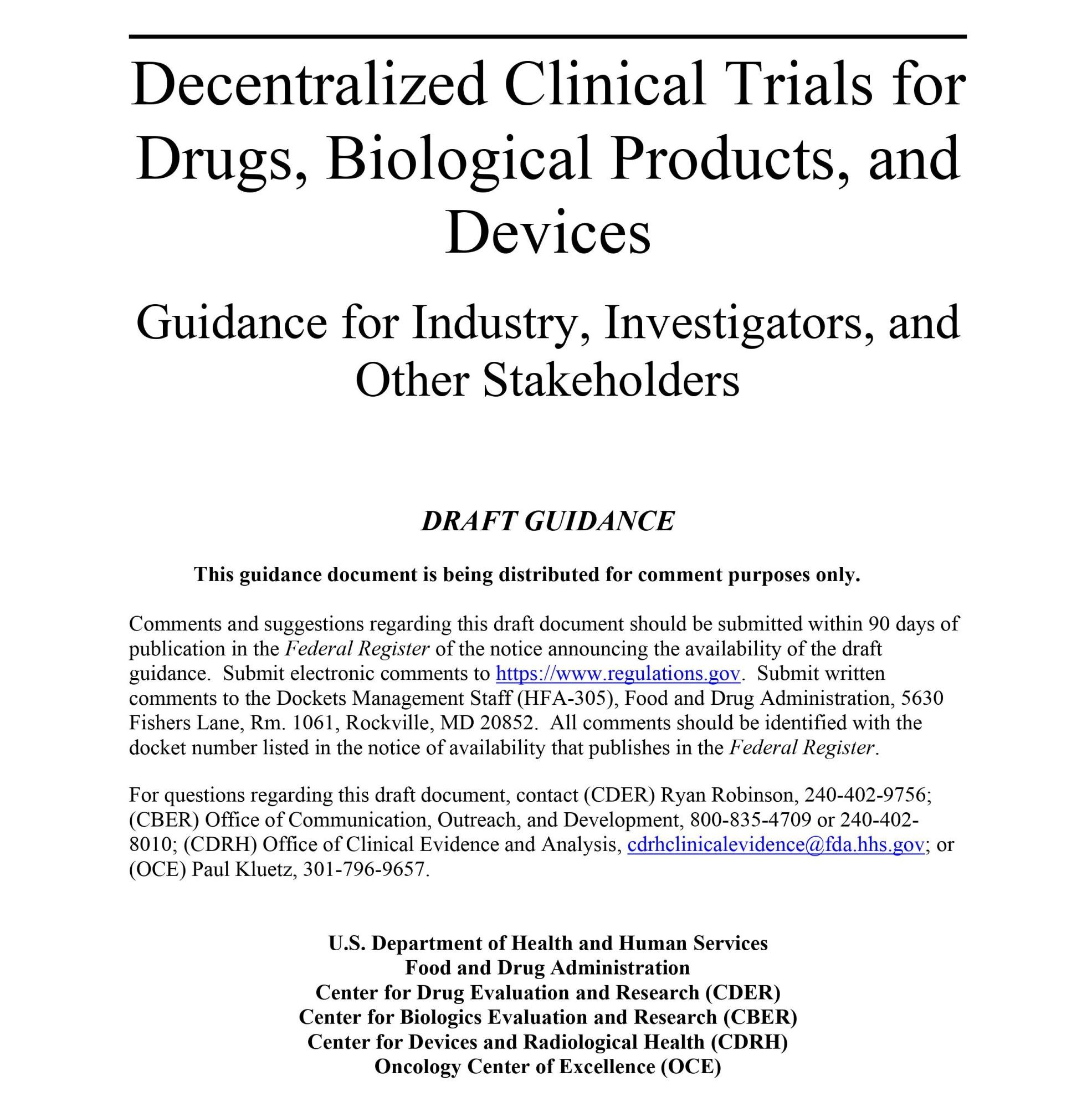
A Modern Approach to Clinical Research
The U.S. Food and Drug Administration (FDA) made a significant stride in clinical research on May 2, 2023, when it unveiled a draft guidance document entitled “Decentralized Clinical Trials for Drugs, Biological Products, and Devices.” The Draft Guidance offers a detailed perspective on how to craft and actualize Decentralized Clinical Trials (DCTs) where some or all of the trial-related undertakings take place outside the traditional clinical trial sites.
Understanding Decentralized Clinical Trials
Defined by the FDA, DCTs involve some or all of the trial-related activities occurring at non-traditional clinical trial sites. This shift was primarily in response to the COVID-19 pandemic, which required innovative solutions in the face of quarantines, site closures, and travel limitations. The draft guidance builds on the recommendations the FDA issued during the pandemic and introduces specific advice on leveraging digital health technologies (DHTs) to conduct DCTs.
The Role and Value of DCTs
By allowing remote participation, DCTs potentially amplify convenience for trial participants, lessen caregiver burden, and catalyze research on rare diseases. Furthermore, DCTs offer a chance to involve a more diverse population in clinical research, thereby extending access beyond traditional trial locations. This evolution demonstrates FDA’s commitment to modernize its approach to clinical research, highlighting the critical role of digital health technologies in the evolving research landscape. This also underscores the enduring benefits of innovations triggered by the COVID-19 pandemic for the future of medical research and product development.
Key Elements of DCT Implementation
For a successful DCT implementation, the guidance outlines several key components. Consultation with FDA review divisions is essential for design considerations like data variability. Additionally, digital health technologies used for data acquisition should be affordable, accessible, and in line with FDA’s DHT-specific guidance.
The DCT investigator’s role may change due to the integration of telehealth, remote work, local healthcare providers, and digital health technologies. Informed consent can be obtained electronically in DCTs provided it meets all regulatory requirements. The FDA also suggests the use of a central Institutional Review Board (IRB) for a more efficient review process.
The administration of investigational products is a critical aspect of DCTs, with regulations depending on various factors such as risk profile and stage of product development. Safety monitoring plans should also account for the decentralized nature of the trial, with FDA providing guidelines for these.
Similarities Between DCTs and Traditional Site-Based Trials
Despite their distinct location, DCTs need to adhere to the same requirements as traditional site-based trials. For instance, even fully remote DCTs should maintain a central physical location for clinical trial-related records accessibility. Telehealth visits can replace in-person visits when physical interaction isn’t necessary and are deemed suitable for DCTs.
Sponsors’ responsibilities remain the same for DCTs and traditional site-based trials. The FDA advises sponsors to ensure proper coordination and oversight of decentralized activities and encourages diversity in trial populations.
Potential Benefits and Challenges of DCTs
DCTs can augment convenience for trial participants, reduce caregiver burden, widen access to diverse populations, enhance trial efficiencies, and facilitate research on rare diseases and those affecting populations with limited mobility. However, the decentralized nature of DCTs presents coordination challenges. Investigators retain the responsibility for the trial’s overall conduct, informed consent, and ensuring appropriate investigational product administration and assessments.
The Road Ahead for DCTs
The FDA’s draft guidance underscores the crucial role of investigators in DCTs. They are responsible for the trial’s overall conduct, obtaining informed consent, appropriate administration of investigational products, and ensuring efficacy and safety assessments. A comprehensive plan should be in place to facilitate the coordination of trial activities in DCTs.
While DCTs present unique challenges and considerations, they offer an opportunity to streamline and diversify clinical trials. Adopting these trials enhances the convenience and reach of research, benefiting a broader patient population. Stakeholders considering DCTs should review the new FDA guidance and stay updated on developments. The FDA invites comments on the draft guidance until August 1, 2023.
Through the draft guidance and additional resources provided, the FDA aims to facilitate a greater understanding of DCTs and the role of digital health technologies in product development. This initiative embodies FDA’s ongoing commitment to modernizing clinical trials and broadening access to diverse populations, signaling a significant step in product development.
Alexandra (Sandy) Reid is a StarFish Medical QA/RA specialist. She brings years of experience working in the industry. Sandy supports the QA/RA team in helping clients develop and deliver FDA Approved or Cleared Medical Devices.







